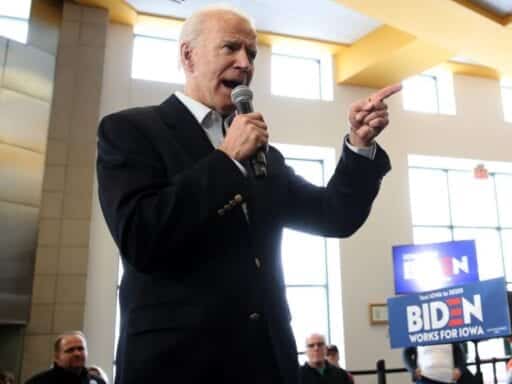People with disabilities want to know they matter.
In a tight Democratic primary race, disability rights has emerged as a leading issue. Sens. Elizabeth Warren and Amy Klobuchar, entrepreneur Andrew Yang, and former South Bend, Indiana, Mayor Pete Buttigieg have all released extensive plans, reflecting their visions for improving the lives of disabled Americans. On Friday, Sen. Bernie Sanders joined them with an audacious plan of his own. Disabled Iowans will go to the polls today knowing where most of the frontrunners stand on their issues. The only serious candidate without a detailed disability rights plan? Joe Biden.
It’s worth noting that billionaires Tom Steyer and Mike Bloomberg don’t have disability rights plans, either. To quote Vox’s Kelsey Piper on billionaires running for president: “[They’re] very unlikely to win, it’s not clear [they] have the skills to do the job well, and there are much, much better ways to make a difference with [their] billions.” So it’s not surprising that they haven’t put much effort into drafting policy.
Biden, on the other hand, is a seasoned political veteran and a serious contender. While he has touted his support for the Americans With Disabilities Act on social media, he has not yet released a disability plan. When asked about this, his national press secretary told Vox that Biden will release a plan that builds on his support for legislation like ADA and the Affordable Care Act but did not clarify when. Currently, on his website under disability, there is a placeholder page in which Biden promises to fully fund the Individuals With Disabilities Education Act — a promise every other Democratic frontrunner has either made or exceeded, including Steyer.
The lack of details matter. Disabled voters need to be able to make informed decisions about our lives. We want to know about where a candidate stands on deinstitutionalization and tackling waiting lists for home care. We want to know how a candidate might handle the issue of police violence against disabled people, particularly disabled people of color. In Iowa, disabled caucus-goers (at least those who can access the caucus at all) do not have a full set of facts with which to make their decisions.
Biden has also said little to nothing about disability in public. In interviews and during debates, he has discussed his stutter. But personal experience is not a substitute for an informed, systemic approach. People who stutter don’t apply for Medicaid or Social Security because of it. People don’t rely on home health aides to get dressed in the morning or worry about being confined to nursing homes because they stutter. Despite having a disability, Joe Biden is largely insulated from some of the more difficult, systemic, and policy-reliant parts of life for many disabled Americans. Simply having a disability does not make someone an expert on disability policy or an advocate for disability rights.
Biden seems to have made “electability” the key selling point of his candidacy. The question of whether Biden can beat President Trump in the general election is frustrating. Asking whether a candidate is electable is very much like asking what color a candidate’s aura is — maybe there’s something there and I’m just not able to see it, or maybe there’s nothing there and people are just seeing what they want to see. “Electability” is not measurable. It doesn’t give a sense of what a candidate values or who they might recruit to lead with them. It’s a claim without substance or basis beyond poll numbers, and we all know polls can be misleading. After all, Hillary Clinton polled better than Trump right up until the votes came in.
That leaves us with candidates’ policy plans and the company they keep to evaluate who they are and what they value. Joe Biden has stressed the diversity of his staff, and it is probably the most attractive aspect of his candidacy right now. But most of the candidates have exceptionally talented, diverse teams. If Biden’s staff is full of seasoned former Obama appointees and experienced professionals, it’s not unreasonable to expect them to do and be better.
Biden has released some detailed policy plans before the Iowa caucuses — like his plan for organized labor and his plan for gun violence. However, disability rights was apparently not important enough to roll out before voting begins. In contrast, Warren and Buttigieg have engaged directly with grassroots disabled advocates through community institutions like #CripTheVote and have expansive plans addressing everything from wheelchair damage during air travel to the school-to-prison pipeline. Sanders has made disability rights part of his closing argument in Iowa for why he should be the Democratic candidate, even including specific provisions addressing the state’s Medicaid managed care disaster.
There’s still time for Biden to release his disability rights plan — it’s not Super Tuesday yet. The candidate who will represent the Democratic Party in the general election has not been chosen. But disabled voters in Iowa won’t have the privilege of knowing Biden’s position on the issues that are most important to them before they cast their ballots. Biden’s relative silence on disability may have been normal and acceptable in past years, but this election cycle, disability matters. Biden needs to catch up with the rest of the candidates and tell voters where he stands.
Sara Luterman is a Washington, DC-based freelance journalist and commentator. She writes about disability politics, research, and culture. Her work has appeared in the Washington Post, Slate, the New York Times, and Undark Magazine, among other outlets. Follow her on Twitter.
Author: Sara Luterman
Read More



